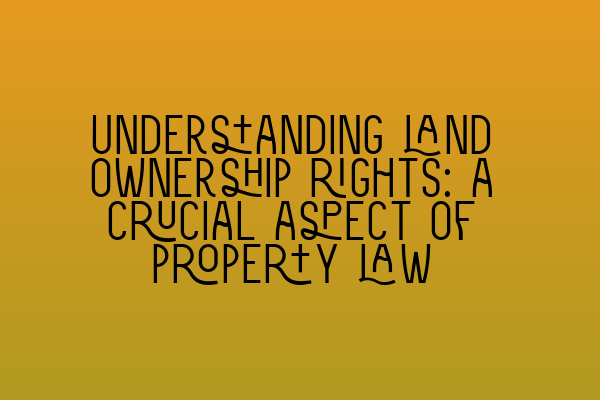Understanding Land Ownership Rights: A Crucial Aspect of Property Law
As a property owner or someone looking to invest in real estate, it is essential to have a thorough understanding of land ownership rights. Property law is a complex and multifaceted area that governs the rights and responsibilities associated with owning, using, and transferring land. Without a proper grasp of these rights, you may find yourself facing legal issues or conflicts with other landowners.
In this blog post, we will delve into the key concepts of land ownership rights, explaining their significance and implications. By the end, you will have a comprehensive understanding of the legal framework that governs land ownership in the UK. So, let’s dive in!
1. Freehold Ownership:
One of the most common forms of land ownership in the UK is freehold ownership. When you own a property outright, you hold the freehold estate. This means that you have full control over the land and the structures on it, subject to any legal restrictions. Understanding the rights and responsibilities that come with freehold ownership is crucial for property owners. To explore this topic further, check out our blog article on SQE 2 Preparation Courses.
2. Leasehold Ownership:
Leasehold ownership is another prevalent form of land ownership in the UK. In this arrangement, the property owner (known as the freeholder) grants a lease to a tenant (known as the leaseholder) for a specific period. Leasehold ownership comes with its own set of rights and obligations. If you want to learn more about leasehold ownership and the intricacies surrounding it, we highly recommend reading our insightful article on SQE 1 Practice Exam Questions.
3. Rights and Restrictions:
Land ownership rights come with certain rights and restrictions that are crucial to understand. These can include easements, covenants, and zoning laws, among others. Easements grant the right of way or use of someone else’s land, while covenants establish obligations that run with the land. Zoning laws dictate how land can be used, such as residential, commercial, or industrial purposes. Familiarizing yourself with these rights and restrictions is essential to ensure compliance with the law and avoid potential legal disputes. To delve deeper into this topic, have a look at our informative article on SRA SQE Exam Dates.
4. Transferring Ownership:
Transferring ownership of land requires adhering to specific legal procedures. Whether you are buying or selling property, understanding the conveyancing process is vital. Conveyancing involves the transfer of legal ownership from one party to another and includes various steps, such as property searches, drafting contracts, and completing the registration process. To gain a comprehensive understanding of the complexities involved in transferring land ownership, we recommend checking out our informative blog post on SQE 1 Practice Mocks FLK1 FLK2.
5. Land Registration:
In the UK, land ownership is registered with the Land Registry. Registering land provides a secure and easily accessible record of ownership and interests in land. It is important to understand the benefits and requirements of land registration to ensure a smooth and legally compliant process. We have a helpful article on SQE 1 Preparation Courses that dives deeper into the intricacies of land registration if you would like to delve into this topic further.
Conclusion:
Understanding land ownership rights is fundamental in the realm of property law. As a property owner or investor, having a firm grasp of these rights will help you navigate legal complexities and make informed decisions. By familiarizing yourself with freehold and leasehold ownership, rights and restrictions, transferring ownership, and land registration, you will be well-equipped to handle any land-related matters that arise.
If you need specific legal advice or assistance with property matters, it is recommended to consult with an experienced property law solicitor. At SQE Property Law & Land Law, we offer expert legal services to clients seeking assistance with all aspects of property law. Contact us today to schedule a consultation and ensure your property transactions are handled with professionalism and expertise.
